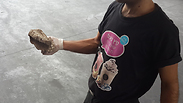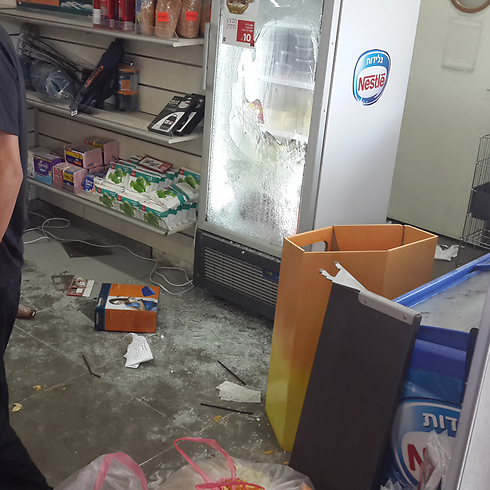
Stone thrown at the gas station in French Hill.
צילום: נועם דבול דביר
French Hill residents call for new fence
After Issawiya rioters trash gas station, residents of Jerusalem's French Hill want a fence to divide the two neighborhoods and keep rioters out.
Rising ethnic tension along the separation barrier between Israel and the West Bank has reached boiling point in Jerusalem's French Hill neighborhood recently, and some of the area's Jewish residents are calling for a new fence to be built - one they believe would increase security and prevent Palestinians with violent motives in nearby Issawiya from crossing into the neighborhood.
The idea of a new fence is gaining ground after dozens of masked rioters from Issawiya trashed a gas station in French Hill last week. The masked men stole goods from the convenient store and tried to set the building alight using a Molotov cocktail before spilling oil on the road at the entrance to the area and damaging the gas station's fuel pumps.
The gas station incident was apparently connected to violence that erupted after the announcement that 16-year-old Mohammed Sinokrot had died of his wounds after apparently being shot by a rubber bullet from IDF troops the week prior.
French Hill residents say that while the most recent violence stemming from Sinokrot's death was the worst they've seen from Issawiya, it also wasn't the first of its kind.
Related stories:
- East Jerusalem riots continue after funeral of Arab teen
- Parents concerned by cuts to security at East Jerusalem girls' school
- Palestinian rioters clash with police in Jerusalem
Even Israel Border police take extended caution when operating in and around the area of Issawiya. "We go in there with a least three vehicles," said one soldier. "If you go in alone, you put your life in danger," he warned.
Indeed, Issawiya has a long history of violence and unrest. When the partition wall was planned, Issawiya made it onto the Israeli side and Palestinian residents were granted full citizenship. Tensions still remained, but when out and about, Hebrew and Arabic can be heard interchangeably in most places and seemingly shows the ability of the two populations to coexist.
The idea for building a fence to divide the two neighborhoods however, seems to represent a deeper disparity between the two communities - one which can be observed from a distance. From the French Hill balcony of attorney Assad Massawi, the differences in economic development between the two neighborhoods become obvious.
According to Massawi, "The Arab neighborhoods surrounding us are neglected by the municipality." Everyday tensions are also on the rise as Issawiya residents frequent shopping centers and restaurants in the more developed French Hill. "It's natural that they would want to go out in a well-maintained neighborhood," said Massawi.
Chairman of Community Management for the French Hill and Ramat Eshkol neighborhoods, Eli Rosenfeld, is one of the most vocal advocates of building a fence between the communities and suggested that the mentality of his Palestinian neighbors is part of the wider issue that leaves Jewish residents afraid of more violence.
"What bothers us are the residents from the West Bank and from East Jerusalem who sometimes think that they can behave in this place as if it was theirs. We're against this and think that we need to deal with the root of this problem," said Rosenfeld.
"Just as rioters chose to destroy the gas station, they could go to a school or a private house next time," warned the chairman.
Palestinian residents like Adam Darwish, who begins his mornings at a cafe in French Hill, strongly oppose the idea of a dividing fence. "I was born here, I grew up here; where do they want me to drink coffee, Tel Aviv?" he asked sarcastically. According to Darwish, the increased tension is due to neglect from the authorities.
"There is no community in Issawiya," he said. "The sewage runs in the streets and there's a lot of frustration and anger among the kids."












